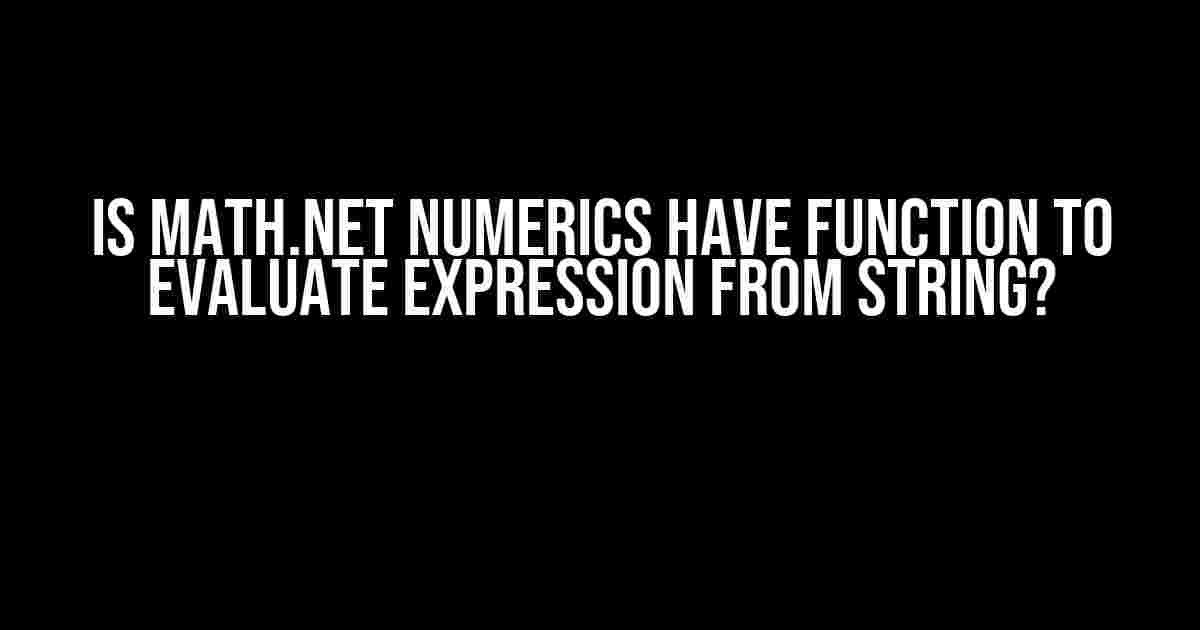If you’re a .NET developer working with mathematical expressions, you might have stumbled upon the Math.NET Numerics library. This powerful tool provides an extensive range of numerical computations, algebra, and more. But, have you ever wondered if Math.NET Numerics can evaluate expressions from strings? In this article, we’ll dive into the world of mathematical expressions and explore the capabilities of Math.NET Numerics.
What is Math.NET Numerics?
Evaluating Expressions from Strings
Now, back to our main question: Can Math.NET Numerics evaluate expressions from strings? The short answer is yes! Math.NET Numerics provides a built-in function to evaluate mathematical expressions from strings. This function is called `EvaluateExpression` and it’s part of the `MathNet.Numerics.Expressions` namespace.
Using EvaluateExpression Function
To use the `EvaluateExpression` function, you’ll need to create an instance of the `Expression` class and pass the string expression as an argument. Here’s an example:
using MathNet.Numerics.Expressions;
// Create an instance of the Expression class
var expression = new Expression("2*x + 3*y");
// Evaluate the expression with x = 2 and y = 3
var result = expression.Evaluate(new Dictionary<string, double> { { "x", 2 }, { "y", 3 } });
Console.WriteLine($"The result is: {result}");
In this example, we create an instance of the `Expression` class and pass the string expression “2*x + 3*y”. We then evaluate the expression by passing a dictionary containing the values for x and y. The result is printed to the console.
Supported Operators and Functions
The `EvaluateExpression` function supports a wide range of operators and functions, including:
- Arithmetic operators: +, -, \*, /, %(modulus), ^(exponentiation)
- Comparison operators: ==, !=, >, <, >=, <=
- Logical operators: &&, ||, !
- Trigonometric functions: sin, cos, tan, asin, acos, atan
- Hyperbolic functions: sinh, cosh, tanh
- Exponential functions: exp, log
- Statistical functions: mean, median, mode, stddev, variance
Note that the `EvaluateExpression` function also supports user-defined variables and functions. You can create custom functions and variables using the `Function` and `Variable` classes.
Performance and Limitations
The `EvaluateExpression` function is highly optimized for performance and can evaluate complex expressions quickly. However, there are some limitations to keep in mind:
- Expression size: The expression string should not exceed 10,000 characters.
- Recursion: The function does not support recursive expressions.
- Multithreading: The function is not thread-safe and should not be used in multithreaded environments.
Despite these limitations, the `EvaluateExpression` function is a powerful tool for evaluating mathematical expressions from strings.
Real-World Applications
So, why would you need to evaluate expressions from strings? Here are some real-world applications:
- Scientific Computing: Evaluate complex mathematical expressions in fields like physics, engineering, and biology.
- Data Analysis: Calculate statistical measures, such as mean, median, and standard deviation, from large datasets.
- Computer-Aided Design (CAD): Evaluate geometric expressions to create complex shapes and models.
- Fitness Calculators: Develop applications that calculate fitness metrics, such as body mass index (BMI), based on user input.
- Game Development: Create games that involve mathematical puzzles or challenges.
Conclusion
In conclusion, Math.NET Numerics’ `EvaluateExpression` function is a powerful tool for evaluating mathematical expressions from strings. With its extensive range of supported operators and functions, you can perform complex calculations and computations with ease. Whether you’re a developer, researcher, or student, this function can help you simplify your mathematical computations and take your projects to the next level.
| Function | Description |
|---|---|
| EvaluateExpression | Evaluates a mathematical expression from a string |
| Expression | Represents a mathematical expression |
| Function | Represents a custom function |
| Variable | Represents a custom variable |
Remember, the `EvaluateExpression` function is just one of the many powerful features of Math.NET Numerics. Explore the library and discover the endless possibilities for mathematical computations in .NET.
Frequently Asked Question
Got a burning question about Math.NET Numerics and its expression evaluation capabilities? We’ve got you covered!
Does Math.NET Numerics have a function to evaluate an expression from a string?
Yes, Math.NET Numerics provides an expression evaluator that can parse and evaluate mathematical expressions from a string. You can use the `Expression.Compile` method to compile an expression from a string and then invoke the compiled expression to evaluate it.
What kind of expressions can I evaluate with Math.NET Numerics?
Math.NET Numerics supports a wide range of mathematical expressions, including arithmetic, trigonometric, exponential, and logical operations. You can also use variables, constants, and functions within your expressions. The library also provides support for complex numbers and matrices.
How do I handle errors when evaluating an expression with Math.NET Numerics?
When evaluating an expression, Math.NET Numerics may throw an `ExpressionParseException` if the expression is invalid or cannot be parsed. You can catch this exception and handle it accordingly. Additionally, you can use the `Expression.Compile` method to check for errors before evaluating the expression.
Can I use Math.NET Numerics to evaluate expressions with custom functions?
Yes, Math.NET Numerics allows you to define custom functions that can be used within expressions. You can create a custom function by implementing the `IFunction` interface and then register it with the expression evaluator.
Is Math.NET Numerics thread-safe for evaluating expressions?
Yes, Math.NET Numerics is designed to be thread-safe, allowing you to evaluate expressions concurrently from multiple threads. However, it’s essential to ensure that the underlying data structures and functions are also thread-safe to avoid any potential issues.

